I just started to learn C++ on YouTube. Below is my code (which is exactly the instructor typed in his visual studio)
#include <stdio.h>
int main() {
char alpha;
scanf_s("%c", &alpha);
char nextalpha = alpha + 1;
printf("%c\n", nextalpha);
}
When I typed A, the output is ?.
I want my output to be B. (Because the number of B in the ASCII table is one more than that of A.)
